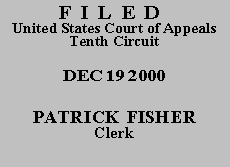

Plaintiff Francel M. Jones, III, an inmate proceeding pro se, appeals the dismissal of his 42 U.S.C. § 1983 action. He contends that the district court erred in dismissing his action sua sponte. In the alternative, he contends the district court should not have dismissed his action for failure to state a claim under 28 U.S.C. § 1915(e)(2)(B)(ii) and still required him to pay the filing fee for the action. We affirm in part, reverse in part, and remand.
Plaintiff filed his § 1983 complaint on May 8, 2000, alleging (1) that during September 1999, he was "a victim of a crime committed by a white man, that was known by [Orth] but no criminal charges were filed"; and (2) that during January 2000, he was placed in disciplinary segregation without a hearing "to inform him of their actions." Record, Doc. 1. The district court dismissed plaintiff's claim that no criminal charges were filed, concluding plaintiff failed "to state a claim for civil rights relief because he challenge[d] a matter of prosecutorial discretion." Record, Doc. 10. With regard to dismissal of his second issue, the district court concluded that "plaintiff's bare allegation that he did not receive a hearing prior to his placement in segregation does not suggest he was subjected to any atypical incident of confinement protected by the Constitution." Id.
A dismissal under 28 U.S.C. § 1915(e)(2)(B)(ii) is reviewed de novo. See Perkins v. Kansas Dep't of Corr., 165 F.3d 803, 806 (10th Cir. 1999). Pro se pleadings are to be construed liberally. See Easterwood v. Champion, 213 F.3d 1321, 1322 n.1 (10th Cir. 2000). "Dismissal of a pro se complaint for failure to state a claim is proper only where it is obvious that the plaintiff cannot prevail on the facts he has alleged and it would be futile to give him an opportunity to amend." Id. The allegations of the complaint must be accepted as true, "and any reasonable inferences that might be drawn from them, in the light most favorable to the plaintiff." Id.
Plaintiff sued Orth for failing to prosecute another citizen. A private individual has no federal right to the prosecution of another. See Doyle v. Okla. Bar Ass'n, 998 F.2d 1559, 1566 (10th Cir. 1993); see also Linda R.S. v. Richard D., 410 U.S. 614, 619 (1973). "[I]t would be contrary to public policy to allow every private citizen to force the prosecutor to proceed with a case in pursuit of a private objective." Dohaish v. Tooley, 670 F.2d 934, 937 (10th Cir. 1982). The district court correctly determined plaintiff did not state a cause of action against Orth.
Plaintiff's cause of action against Shearrer was based on his allegation that he had been "in the disciplinary segregation cell of the Pawnee County Jail since January 2000, a total of 115 days and ha[d] not been provided with a hearing or written notice" as to the reason for his segregation. Record, Doc. 1. He also alleged that Shearrer had treated him differently than other inmates. As the district court noted, the complaint stated but a "bare allegation" of denial of due process. See Record, Doc. 10.
In certain circumstances, placement in administrative segregation does not give rise to a liberty interest. Sandin v. Conner, 515 U.S. 472 (1995); see Talley v. Hesse, 91 F.3d 1411, 1413 (10th Cir. 1996). To invoke Sandin, a court must have facts to "engage in the analysis required by Sandin and determine whether the conditions of plaintiff's confinement presented the type of atypical, significant deprivation that would implicate a liberty interest." Perkins v. Kan. Dep't of Corr., 165 F.3d 803, 806 (10th Cir. 1999). Accepting plaintiff's allegations as true, as we must, it is not clear that Sandin prohibits his claim. He alleged he had been in segregation for 115 days and suggested that he had been treated differently than other prisoners. "[W]henever a plaintiff states an arguable claim for relief, dismissal for frivolousness under § 1915(d) is improper, even if the legal basis underlying the claim ultimately proves incorrect." McKinney v. Okla. Dep't of Human Servs., 925 F.2d 363, 365 (10th Cir. 1991). The district court erred in dismissing plaintiff's claim against Shearrer.
Assuming, arguendo, that the dismissal of his complaint was proper, plaintiff argues he should not be required to pay the full filing fee. Plaintiff misreads 28 U.S.C. § 1915. It does not waive the filing fee nor condition payment of the filing fee on success on the merits, but states "if a prisoner brings a civil action or files an appeal in forma pauperis, the prisoner shall be required to pay the full amount of a filing fee." 28 U.S.C. § 1915(b)(1) (emphasis added). Notwithstanding the district court's dismissal of plaintiff's action, he is still required to pay the full filing fee to the district court.
The district court's dismissal of plaintiff's claim against Orth is AFFIRMED. The district court's dismissal of plaintiff's claim against Shearrer is REVERSED and the matter is REMANDED to the district court for further proceedings. Plaintiff is reminded of his obligation to continue making partial payments of filing fees in district court and on appeal until the fees are paid in full.
Entered for the Court
Mary Beck Briscoe
Circuit Judge
*.This order and judgment is not binding precedent, except under the doctrines of law of the case, res judicata, and collateral estoppel. The court generally disfavors the citation of orders and judgments; nevertheless, an order and judgment may be cited under the terms and conditions of 10th Cir. R. 36.3.